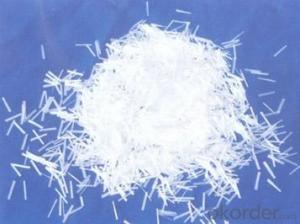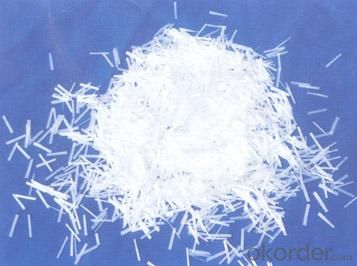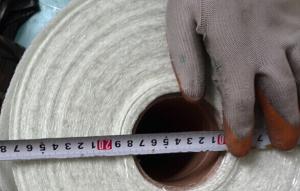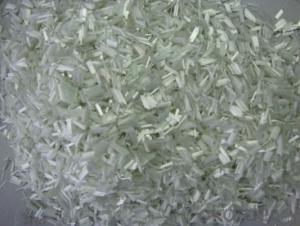Wet Fiberglass Chopped Strands Mat Tissue
- Loading Port:
- China Main Port
- Payment Terms:
- TT or LC
- Min Order Qty:
- 20000kg kg
- Supply Capability:
- 200000kg Per Month kg/month
OKorder Service Pledge
OKorder Financial Service
You Might Also Like
1.Brief Introduction
Wet Chopped Strands are compatible with unsaturated polyester, epoxy and phenolic resins and gypsum.
Wet Chopped Strands have moderate moisture content and deliver outstanding flowability, including dispersion in water and in gypsum.
2.Product Features:
Excellent dispersion in water
Good bonding with multiple resins
Outstanding tensile and tear properties in the final product
3.Product Specifications:
Property | Fibre diameter | Moisture Content | Size Content | Chop |
(%) | (%) | (%) | (%) | |
Mathods | IS01888 | ISO3344 | ISO1887 | |
3mm | ±10 | ≤3.0 | 0.1±0.05 | 98 |
6mm | ||||
12mm | ||||
18mm |
Special specification can be produce according to customer requirements.
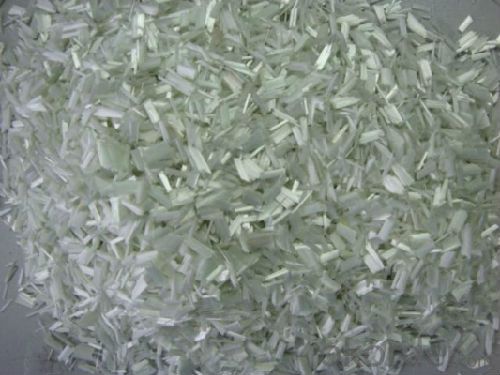
4.FAQ
a.Packaging:
Each bag can be taken (15-25kgs)。 Could also take a big container bag.
b.Storage:
Unless otherwise specified, It should be stored in a dry, cool and rain-proof area. It is recommended that the room temperature and humidity should be always maintained at 15℃~35℃ and 35%~65% respectively.
- Q: Is fiberglass mat tissue easy to install?
- Installing fiberglass mat tissue is relatively easy. This lightweight and flexible material can be easily cut and shaped to fit any surface. It can be applied using different methods, including spraying, rolling, or brushing on adhesive. Moreover, the tissue is self-adhesive, which simplifies the installation process as it readily adheres to the desired surface. Additionally, fiberglass mat tissues are generally designed to resist water and offer excellent insulation, making them a favored choice for various applications. In conclusion, by adequately preparing and following the manufacturer's guidelines, installing fiberglass mat tissue can be a simple and trouble-free task.
- Q: Does fiberglass mat tissue require any special precautions during storage?
- Yes, fiberglass mat tissue does require special precautions during storage. It should be stored in a dry and well-ventilated area to prevent moisture damage. Additionally, it should be kept away from direct sunlight and extreme temperatures as they can degrade the material. Proper stacking and support should also be ensured to prevent any deformation or damage.
- Q: Can fiberglass mat tissue be used for composite pipe manufacturing?
- Yes, fiberglass mat tissue can be used for composite pipe manufacturing. Fiberglass mat tissue provides reinforcement to the composite pipe, enhancing its strength, durability, and resistance to corrosion.
- Q: Is fiberglass mat tissue suitable for insulation in high-rise buildings?
- High-rise buildings can benefit from the suitability of fiberglass mat tissue for insulation. This widely used material possesses exceptional thermal and acoustic properties, making it an ideal choice. Its lightweight and flexible nature, along with easy installation, ensure efficiency and effectiveness in high-rise structures. Furthermore, fiberglass mat tissue boasts excellent fire resistance, a crucial requirement for multi-story buildings. It also resists moisture, mold, and pests, ensuring durability and optimal performance. Customization for walls, floors, and ceilings allows consistent insulation throughout the entire building. In conclusion, fiberglass mat tissue is a dependable and cost-effective insulation solution for high-rise buildings.
- Q: Can fiberglass mat tissue be used for swimming pool construction?
- Certainly, fiberglass mat tissue is suitable for the construction of swimming pools. This versatile material is widely utilized in the construction sector due to its robustness, durability, and ability to withstand water and chemicals. Its primary purpose is to reinforce the swimming pool shells, thereby enhancing their structural integrity and preventing any potential issues like cracking or leakage. Moreover, fiberglass mat tissue is renowned for being lightweight and easy to manipulate, which contributes to its popularity among pool builders. Nonetheless, it is crucial to ensure that the fiberglass mat tissue employed in swimming pool construction adheres to the required standards and regulations in order to guarantee the pool's safety and longevity.
- Q: Does fiberglass mat tissue require any special precautions during transportation?
- Special precautions must be taken during the transportation of fiberglass mat tissue as it is a delicate material that can easily be damaged if not handled correctly. To ensure safe transportation, several measures should be implemented. To begin with, it is necessary to pack the fiberglass mat tissue in a strong and durable material that can protect it from external impacts and vibrations. Heavy-duty cardboard boxes or wooden crates should be used to provide sufficient cushioning and support. Furthermore, it is vital to clearly label the packaging as "Fragile" or "Handle with Care" to alert handlers about the delicate nature of the product. This will help prevent any mishandling or rough treatment during transportation. In addition, the fiberglass mat tissue should be stored and transported in an upright position to minimize the risk of bending or folding that could potentially damage the material. It is also important to avoid placing heavy objects on top of the fiberglass mat tissue to prevent unnecessary pressure or crushing. Lastly, it is advisable to utilize secure and reliable transportation services with experience in handling delicate materials like fiberglass mat tissue. This ensures that the product is transported with the utmost care and attention, reducing the likelihood of damage during transit. By adhering to these special precautions, the risk of damage to the fiberglass mat tissue during transportation can be significantly reduced, guaranteeing its arrival in perfect condition.
- Q: Can fiberglass mat tissue be used for reinforcing swimming pools?
- Yes, fiberglass mat tissue can be used for reinforcing swimming pools. It is commonly used in the construction of pool shells to provide added strength and durability.
- Q: What is the expected lifespan of fiberglass mat tissue in cleanroom applications?
- Several factors can influence the expected lifespan of fiberglass mat tissue in cleanroom applications. The durability and long-lasting properties of fiberglass mat tissue are well-known in cleanrooms. However, variables such as contamination level, cleaning procedures, maintenance practices, and overall cleanroom conditions can impact its lifespan. By providing proper care and regular maintenance, fiberglass mat tissue can typically endure for several years in cleanroom applications. Extending its lifespan can be achieved through frequent cleaning and replacing any damaged or contaminated sections. Following the manufacturer's guidelines and recommendations for cleaning and maintenance is crucial to ensure optimal performance and longevity. Furthermore, the expected lifespan of fiberglass mat tissue can also be influenced by its quality and grade. Higher-quality materials exhibit greater resilience and can withstand environmental stressors better than lower-grade options. Therefore, investing in high-quality fiberglass mat tissue can contribute to a longer lifespan in cleanroom applications. To summarize, there is no definitive answer regarding the exact expected lifespan of fiberglass mat tissue in cleanroom applications. However, regular maintenance, proper care, and the use of high-quality materials can significantly increase its longevity.
- Q: Is fiberglass mat tissue suitable for railway rolling stock?
- Indeed, fiberglass mat tissue proves to be a fitting option for railway rolling stock. This lightweight and resilient material is frequently utilized in the construction sector for a multitude of purposes, including the production of railway rolling stock. Its exceptional mechanical robustness and resistance to corrosion render it optimal for deployment in the challenging and rigorous settings characteristic of railway rolling stock operations. Furthermore, fiberglass mat tissue exhibits commendable thermal insulation characteristics, contributing to enhanced energy efficiency within the rolling stock. All in all, fiberglass mat tissue emerges as a suitable and dependable selection for the construction and upkeep of railway rolling stock.
- Q: Is fiberglass mat tissue resistant to mildew and rot?
- Yes, fiberglass mat tissue is resistant to mildew and rot. Fiberglass is made from fine glass fibers that are woven together to create a strong and durable material. These fibers are non-porous and do not absorb moisture, making fiberglass mat tissue highly resistant to the growth of mildew and the decomposition caused by rot. Additionally, fiberglass is often coated with protective finishes or treated with additives that further enhance its resistance to these types of biological degradation. This makes fiberglass mat tissue an excellent choice for applications where moisture or humidity is a concern, such as in bathrooms, outdoor structures, or areas prone to high humidity.
Send your message to us
Wet Fiberglass Chopped Strands Mat Tissue
- Loading Port:
- China Main Port
- Payment Terms:
- TT or LC
- Min Order Qty:
- 20000kg kg
- Supply Capability:
- 200000kg Per Month kg/month
OKorder Service Pledge
OKorder Financial Service
Similar products
Hot products
Hot Searches
Related keywords
